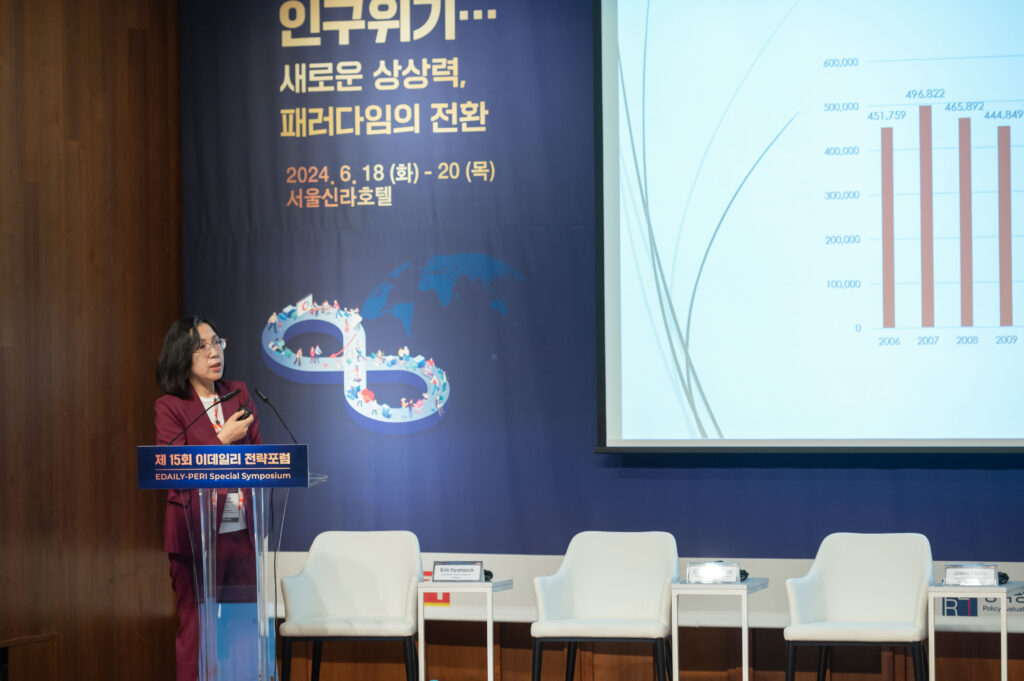Session 3 : PERI-MDRC Evidence-Based Immigration Policy
SPEAKERS
Hyun-Sook Kim(Professor of Department of Economics, Soongsil University)
<“Effects and Alternatives of South Korea’s Pro Natal Policies”>
South Korean is currently facing a low birthrate crisis due to the continuous decline in marriage rates and the total fertility rate. As a result, the budget for addressing low birthrates has been increasing annually. The Basic Plan for Low Birthrate and Aging Society, established in 2006 to boost the fertility rate, initially focused on cash support for childbirth and childcare but has gradually evolved to include comprehensive support measures such as housing and parental leave. The current Suk-Yeol Yoon administration is addressing the low birthrate crisis by focusing on five key areas: providing high-quality childcare and early childhood education, offering working parents time to spend with their children, delivering family-friendly housing services, reducing childcare costs, and ensuring healthy children and happy parents.
Since the implementation of fertility enhancement policies, childcare and early childhood education services have rapidly expanded since 2006, and various allowances and subsidies provided by both local governments and the central government have increased. The emphasis on work-family balance has led to an increase in female employment rates and male parental leave, and the family-friendly certification system has become established. However, the impact of investments in childcare services and childbirth incentives seems to diminish over time, and the effectiveness of the central government’s cash support requires further validation.
The support for work-family balance shows significant positive effects above a certain level, while the benefits of male parental leave in family-friendly certified companies are not statistically significant. The impact on the general fertility rate varies by age group and company size, and the effect on female employment also differs by job rank. Consequently, while the effectiveness of childcare and early childhood education services and childbirth incentives appears to wane, the support for work-family balance has proven to have a consistently positive impact. Therefore, it is crucial to shift the paradigm of fertility policies towards promoting work-family balance and establishing a family-friendly culture within companies. Additionally, it is necessary to approach the low birthrate issue from various angles, such as immigration policies and youth housing support policies, and to analyze their effectiveness.

ㅇCynthia Miller(Senior Fellow of Manpower Demonstration Research Corporation(MDRC))
<“Building evidence with randomized controlled trials : Examples from the US“>
When introducing a new policy, how can we determine whether it will be effective? This can be assessed through Randomized Controlled Trials (RCTs), which compare “people without the policy” to “people with the policy.” In an RCT, subjects are randomly assigned to either a “program group” or a “control group,” and the differences between these groups are then compared. RCTs were first introduced in the field of social policy in the 1960s. As of 2023, there are over 1,500 RCTs registered with the American Economic Association, conducted in more than 90 countries.
An example of an RCT in practice is the WorkAdvance program. In the United States, while wages for individuals without a college degree have been declining, companies are facing a shortage of skilled workers. Previous studies suggested that simple employment promotion or job-specific skills training could be effective policies. However, these did not positively impact employment rates and even led to further wage declines. Therefore, an RCT was conducted to determine if the WorkAdvance program, which includes training programs aimed at overall job improvement, could be beneficial.
Four suitable training institutions were selected to provide the job training, with these institutions being distributed across different regions and sectors. Participants who would receive the training were rigorously pre-screened. The RCT results showed that the Work Advance program significantly increased the wages of trainees over a three-year period. Moreover, this effect persisted for up to seven years.
The United States has institutionalized “evidence-based policy-making,” and the results of RCTs have influenced labor-related legislation. RCTs do not analyze the causes of why a policy produces certain results but provide an average outcome for the targeted subjects. The results are specific to the study period and the particular group under investigation and should not be generalized to other groups without careful consideration. This experimental approach can be applied to various social policy fields and serves as a useful means for estimating the effectiveness of policies. Additionally, RCTs provide a solid evidence base for numerous studies and policies.

ㅇJames Riccio (Principal Research Fellow of Manpower Demonstration Research Corporation(MDRC))
<“Using Randomized Trials to Test Innovations Related to Immigration and Other Policies in Response to Declining Birth Rates in Korea ”>
To discuss whether the effects of reform tasks for Korea’s immigration and childcare policies can be pre-measured through Randomized Controlled Trials (RCTs), a method of social experimentation, we can take the modification of the Employment Permit System (EPS) as a representative example. In Korea, foreign workers from 16 countries can apply for non-professional (E-9) visas through the Employment Permit System (EPS). Officials responsible for the EPS use algorithms to match foreign workers with domestic employers based on their skills. However, the current system has a low success rate in matching workers with employers, and even when a match is made, workers often change jobs within a year. This issue stems from limited information about the workers and employers, restricted choices for workers, and the system’s inability to accurately assess competencies beyond technical skills, such as diligence.
To address these issues, an RCT can be conducted to test the introduction of an “Enhanced Employment Permit System.” For this experiment, participants would be divided into a treatment group (subject to the enhanced EPS) and a control group (subject to the existing EPS). Over several years, data from both groups would be collected and analyzed. The goal would be to determine if the enhanced EPS reduces job turnover among foreign workers, improves job stability, increases wages, and raises employer satisfaction. This approach could help the Korean Ministry of Labor reduce the costs associated with failed matches between foreign workers and domestic employers.
When implementing RCTs for immigration policy and other social policies in Korea, several considerations should be addressed. Firstly, carefully examine which policies have the potential to benefit the most from evidence-based approaches. Secondly, ensure a solid foundation for implementing RCTs, including preemptive consideration of any ethical issues. Thirdly, emphasize long-term effects rather than just short-term outcomes through extended observation periods. Lastly, to fully understand the policy impacts, integrate qualitative methods alongside quantitative analyses.
By addressing these considerations, RCTs can provide valuable insights into the effectiveness of policy reforms and contribute to more informed decision-making in Korea’s immigration and social policy development.

DISCUSSION HIGHLIGHTS
 <PERI, Policy Evaluation Research Institute>
<PERI, Policy Evaluation Research Institute>


